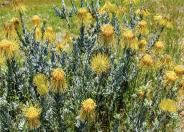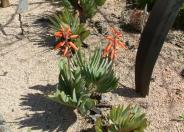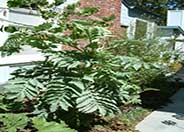
Common name:Dwarf Lily of the Nile
Botanical name:Agapanthus 'Peter Pan'
This variety of Agapanthus has a growth of blue flowers between 12"-18" high. This variety is a dwarf form of the Agapanthus parent plant. It is both smaller in size and has much thinner leaves than the parent.

Common name:Yellow Rocket Pincushion
Botanical name:Leucospermum reflexum var. luteum
Yellow Rocket Pincushion is an attractive shrub that can reach 6-8' tall and 5-6' wide. The plant has a rounded habit with evergreen, gray green leaves held closely to the stems. Beautiful and unusual looking, pincushion looking flowers appear in late spring and bloom through summer. These yellow flowers droop during the bloom period. Flowers attract birds and bees. Great for flower arrangements. Plant in full sun in coastal gardens as it tolerates salt winds. It does well in sandy or loam soil that is neutral or acid in pH. This shrub does best with well draining soil. Established plants are drought tolerant, needing very little water in winter. A beautiful shrub for Mediterranean style gardens also.

Common name:Fan Aloe
Botanical name:Kumara plicatilis
This wide succulent shrub grows 3'-6' tall and wide, with fan-like clusters of the bluish-gray round tipped leaves. From each fan emerges an open terminal cluster of tubular, orange red flowers in late winter to early spring. Plant in full sun if on the coast or in shade if inland. It is hardy to about 23 degrees F. It needs winter and spring irrigation if grown where does does not receive adequate water from rainfall. Formerly called Aloe plicatilis.

Common name:Honey Bush
Botanical name:Melianthus major
Melianthus major is an evergreen shrub. Soft-wooded plant of rapid growth to 12-14 ft. Boldly patterned foliage. Grayish green leaves of 1 ft. long, divided into 9-11 strongly toothed leaflets. Foliage smells disagreeable when brushed or bruised. Foot-long spikes of reddish brown, 1 in. flowers in late winter, early spring.
Designer: UC Berkeley
Photographer: Vicki Anderson
Incorporate compost 6" into your soil to retain water, reduce compaction, feed earthworms, and provide valuable nutrients to your plants.
Attract, or buy beneficial insects such as ladybugs and lacewings to control pest outbreaks in your garden.